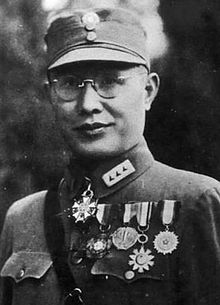
Nationalist Chinese Army general.
Born into a landowning family in Xinyi (Hsing-i), Guizhou (Kweichow) Province on 2 April 1890, He Yingqin (Ho Ying-ch’in) received a thorough military education in both Chinese and Japanese military schools. After the outbreak of the Chinese Revolution in 1911, he returned to China and joined the revolutionary forces in Shanghai, Jiangsu (Kiangsu). Following the ill-fated “Second Revolution” in 1913, he returned to his studies in Japan, which he completed in 1916. In 1924, he was appointed chief instructor at the newly founded Huangpu (Whampoa) Military Academy, and he participated in the Northern Expedition. He became a close associate of Jiang Jieshi (Chiang Kai-shek) and directed military operations against dissident Guomindang (GMD [Kuomintang, KMT], Nationalist) forces as well as the Red Army in the “Extermination Campaigns” of the 1930s.
He was ordered to appease the Japanese in the humiliating Tanggu (Tangku) Truce of 1933 and the He-Umezu Agreement of 1935, resulting in widespread student demonstrations against GMD policy. After the Lugougiao (Lukouch’iao) Marco Polo Bridge Incident and the onset of a full Sino-Japanese War in 1937, He was appointed chief of staff of the Chinese army. Between 1942 and 1944, he developed a prickly rivalry with U.S. Lieutenant General Joseph W. Stilwell, commander of forces in the China-Burma-India Theater and Allied chief of staff to Jiang. He also clashed with General Chen Cheng (Ch’en Ch’eng), Stilwell’s choice for Chinese commander. When Stilwell was relieved of command in 1944, he was relieved of his war portfolio but not his military position.
On 9 September 1945, He formally received the Japanese surrender in Nanjing (Nanking) in Jiangsu from General Okamura Yasuji, commander of Japanese forces in China. During the Chinese Civil War period, He’s political fortunes waned. In 1949, he joined the Nationalists on Taiwan. He served as chief Chinese delegate to the United Nations’ Military Advisory Committee (1946–1948) and then as chairman of the Strategy Advisory Committee in Taiwan (1950–1958). He died in Taipei on 21 October 1987.
References Eastman, Lloyd. Seeds of Destruction: Nationalist China in War and Revolution, 1937–1949. Stanford, CA: Stanford University Press, 1984. Chi, Hsi-sheng. Nationalist China at War: Military Defeats and Political Collapse, 1937–45. Ann Arbor: University of Michigan Press, 1982. Tuchman, Barbara. Stilwell and the American Experience in China, 1911–1945. New York: Macmillan, 1970.